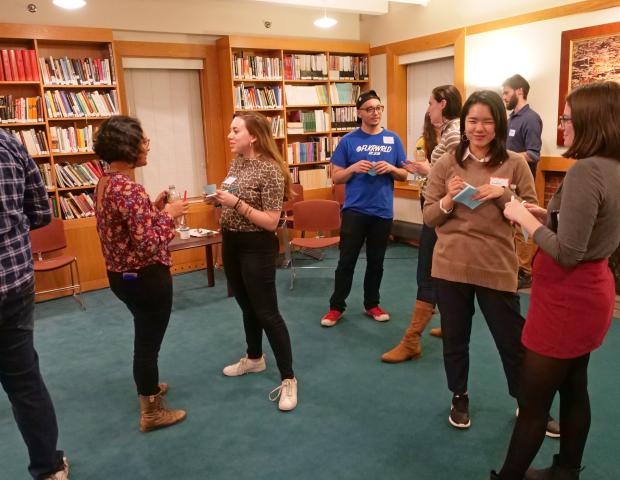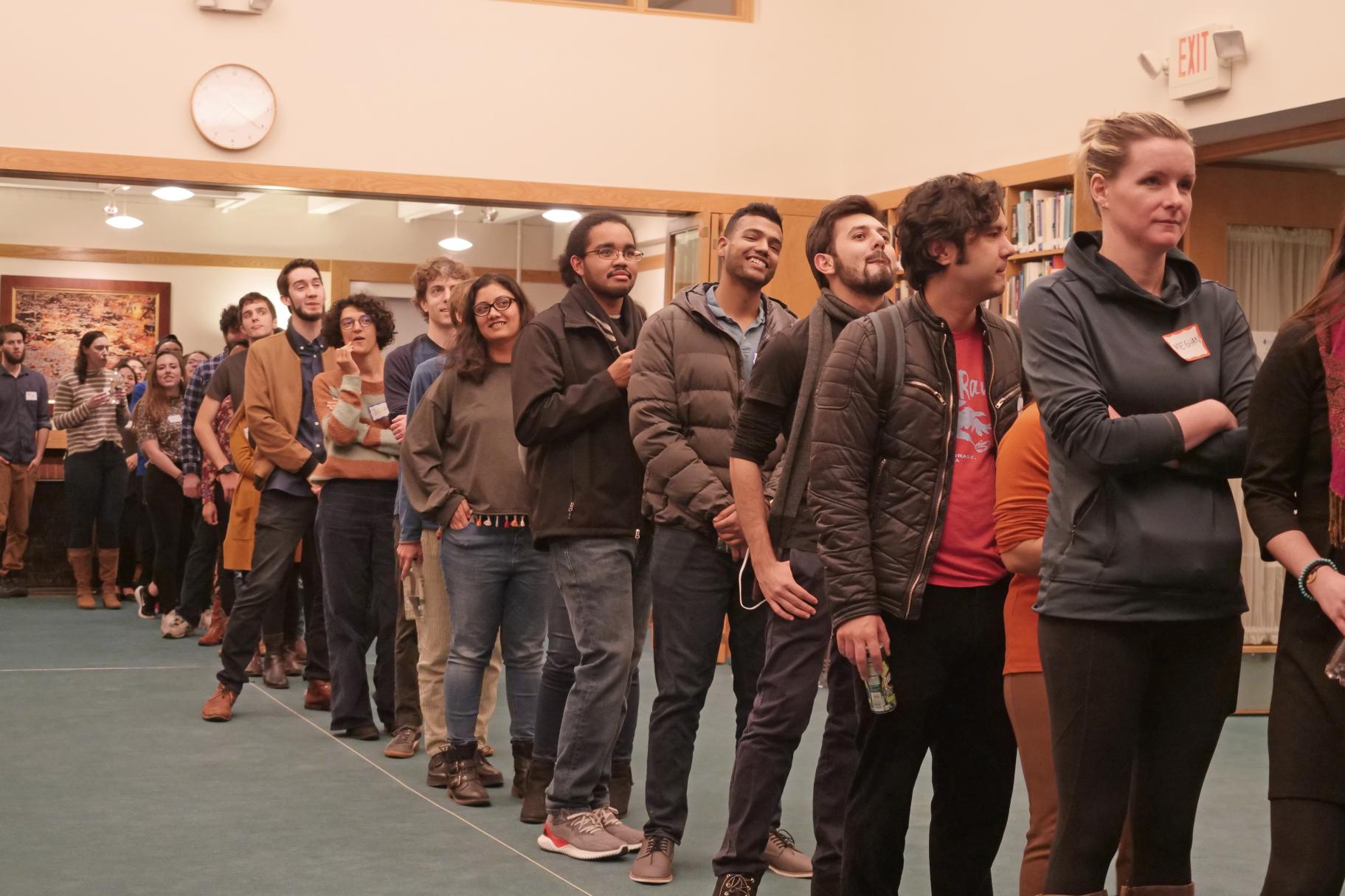Dialogue Nights #15: Challenging Fear With Courage
There is the courage of superheroes and soldiers at war. Blockbuster courage, let’s call it. Then there is the courage of everyday people living regular lives – lives that are nevertheless heroic in their own way, especially when they are defined by a refusal to be defeated by the inevitable challenges of life, and even more, when they manifest a commitment to the happiness and wellbeing of others. These were the kinds of qualities that were celebrated and explored during the first Dialogue Nights of 2020, held at the Ikeda Center on Friday, January 31.
Called “We Can Do It! Challenging Fear With Courage,” the gathering featured more than forty-five Boston-area university students and young professionals engaging in the kind of “life-to-life” encounters that Daisaku Ikeda identifies as central to the creation of cultures of peace. This sort of engagement provides the impetus for Dialogue Nights. As Ikeda Center Program Manager Lillian I explained in her welcoming remarks, “we decided to start Dialogue Nights in the fall of 2017, hoping to create a space where young people can practice and experience the transformational power of connecting with others on a deeper level, and for us to confront our own feelings of powerlessness and hopelessness about the world we live in, and ultimately feel empowered to change the world starting with changing ourselves.”
The goals for this Dialogue Nights, said Lillian, were both personal and social, intended to help participants live up to the goals they have set for themselves for 2020, but also to find the courage to face the many issues in our world that inspire fear, indeed that “paralyze us” from taking action at all. The importance of this latter point was articulated by Mr. Ikeda in the quote that Lillian said inspired the event: “the future of humankind depends on young people who have the courage to confront reality, never submitting before adversity.”
With that large goal in mind, the evening started with an icebreaker activity that gauged people’s fear levels around smaller, daily-life matters, ranging from saying hi to a stranger to driving in Boston to bungee jumping. In an encouraging sign for society, very few expressed fear about apologizing for a mistake they made!
For the second icebreaker, Lillian said that now that they had “explored their comfort zones,” they would “go a little deeper.” For this activity, she said, participants should gather into pairs to write down one of their biggest fears and to share with their partner why it makes them fearful. After a quick five-minute discussion, they shared some responses. “My fear,” said one, “is to repeat my mistakes,” with the result being “stagnation.” Another participant, a scientist, said that from his research he knows that the future is “uncertain,” a fact that makes him fearful. Another mentioned the fear “of losing loved ones.” The last to share said that her fear is that someday she might find herself without family and then get cancer, having to face it alone. After sharing, participants took their responses, which were written on large post-it notes, and displayed them around the room, with the purpose of returning to them later, after the qualities of courage had been explored and celebrated through dialogue.
Introducing the next portion of the evening, Center Events and Publications Coordinator Anri Tanabe asked, “When you think of courage, what do you think of? Someone who is brave? Someone who stands up to fight against injustice? What about just being able to get back up today when yesterday you felt down?” These were the kinds of questions the event planning staff kicked around as they were brainstorming the event, she said. So, in order to expand their thinking, they decided to head over to Harvard Square to create a video to be shown at tonight’s Dialogue Nights featuring young people sharing their conceptions of courage. Some of the ideas about courage the young interviewees offered were: confronting injustice even when afraid, having the confidence to question your beliefs, being willing to be vulnerable with others, taking the chance to meet people different than yourself, and maintaining your integrity in the face of institutional pressures.
After the video, Anri introduced the first breakout discussion of the evening, asking participants to gather into groups of four to explore three questions to elicit their own experiences with courage:
- What is something in your life that you wished you had more courage to do? What prevents you from doing it?
- Share a time in your life where you were able to overcome your fear. Based on your personal experience, what would you share with someone who is paralyzed by fear?
- Referencing the Ikeda quote shared earlier, as young people in 2020, why do you think it is important for us to have courage? In what ways could that impact our society?
After about 25 minutes of discussion, Anri asked volunteers from the groups to share their thoughts on specific questions or else just “main takeaways” from their dialogue. Here are some of the key findings that were shared.
- The first group to share talked about the “fear of being alone,” or “being alone too often,” a fear they all shared to varying degrees. One problem with too much self-isolation, said one group member, is you can run too many things through your head “unchecked,” whereas with others you can get critical support or input.
- The representative from the next group said that it’s important to find the courage to speak up when important questions are being posed, because “if one person steps up and says something then that will help others and it’s kind of infectious. Now, the whole group is courageous enough to say something.”
- Another group talked about the overload of both good and bad information we are all exposed to today. It’s easy to become “terrified” by the bad, but at the same time we have “all this information” that can help us “look for solutions and learn solutions from other places and other people.” And with this knowledge, we should “stand up and do something” about our challenges.
- Speaking about the loneliness and isolation that studies show to negatively impact so many Millennials, the representative from the next group echoed the language of the previous group, saying that “we need to step up and make sure our friends and family feel supported.” This can be as simple as “checking in with them to make sure that everything is okay in their life.”
- The last group to share talked about how to not get “infected by all the negativity” that characterizes our world today. It takes courage to break through the feeling that nothing can be done and to accept “our responsibility to change the world and inspire others.” Referencing Dr. King they said that “it’s not the violence of the few that scares me, it’s the silence of the many.” It takes a “lot of courage to follow your heart and fight for justice,” they concluded.
After this discussion, Lillian invited everyone to find their “fear buddy” from earlier. Now they can become your “courage buddy,” she said, as she invited them to revisit their fears together and talk about ways they can confront and transform them. After a ten-minute dialogue session some of the participants shared key ideas from their discussions.
- Fear and courage are “two sides of the same coin,” said one pair. They can feed each other. But it’s up to you to decide where the power lies. Even if you don’t necessarily feel it, you “prove” your courage and become “courageous” when you choose it.
- Another young woman said that it’s crucial to not talk yourself out of various actions, convincing yourself “there is going to be a negative outcome.” Case in point: she and her now-husband kept putting off their first date, each thinking that “dating is the worst and it’s not going to work.” Finally they grudgingly went ahead and met, and today they are life partners!
- In a bit of candor that many of us can relate to, a young man shared his fear of spiders. Aside from this particular, he said the larger lesson is to talk about the fear instead of running it over and over through your mind.
- Lots of fear relates to overthinking negative scenarios about the future, said another participant. In her situation as a recent college grad, she had been manufacturing fear about her prospects for a career. Her positive response to this is to “really think about where my mission is.”
- Another feared public speaking, which, she said, is really just a form of fearing “judgment by other people.” Her strategy to deal with this is to always be “free and honest and true to yourself.”
Introducing the final activity of the evening, Lillian I said that for the Center, dialogue is the “starting point for everything,” but that from there, “action is equally important.” Therefore, “to help us continuously bring forth courage throughout the year, we thought it’d be helpful to come up with our own 2020 mottoes or slogans, something that we can say to ourselves when we are struggling with our fear or doubt.” For this activity, participants returned to their original pairs, this time thinking about how they could condense their learnings from the evening into a saying to guide and inspire them through the year.
In keeping with a new Dialogue Nights tradition, Center Office and Program Assistant Preandra Noel — whose own motto is Befriend Your Fears — led an “open mic” session during which volunteers could share their slogans or mottoes with the whole group. Before turning the mic over she shared a couple thoughts about fear. First, she observed how so many of her own fears fall into the category of “What if …” – with virtually no end to the ways to negatively fill in that blank. Then she shared the well-loved quote from Marianne Williamson that “our deepest fear is not that we are inadequate. Our deepest fear is that we are powerful beyond measure… . As we are liberated from our own fear, our presence automatically liberates others.”
Here are some of the slogans and ideas shared by participants during the whole group session.
- Fear tells us that it is necessary. Courage tells us that we are.
- Value yourself. When we “value ourselves for who we are, we will have the courage to do what we really need to do.”
- Often our negative visualizations are more detailed than our positive ones. We can change that and say exactly why things are good.
- The participant who shared earlier about her fear of being alone with cancer said her courageous response is to really have gratitude for her life and everyone in it, and for everything that happens, good and bad. Short version: Love your life.
- Trust your fears and pet them a bit. Your fears are part of you, so welcome them.
- Ask. Believe. Receive.
- Pain is growth.
- Face the fear, accept it, and cherish this moment.
After offering everyone a verbal “high five” and thanking them for their contributions, Preandra turned the mic back over to Lillian, who read a quote from Daisaku Ikeda to close the formal part of the evening: “What may look like a small act of courage is courage nevertheless. The important thing is to be willing to take a step forward.” Then, as participants gathered in the reception area, many who hadn’t shared posted their slogans to the Dialogue Nights bulletin board. Here are just a few:
- I choose courage over perfection!
- Go for it!
- Everything starts from today!
- Things won’t change unless you make them change!
- Be courageous! Fear is only a stepping stone to victory!

